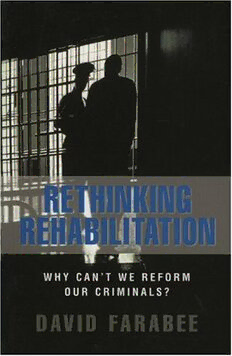
Rethinking Rehabilitation: Why Can't We Reform Our Criminals? PDF
116 Pages·2005·0.402 MB·English
Most books are stored in the elastic cloud where traffic is expensive. For this reason, we have a limit on daily download.
Preview Rethinking Rehabilitation: Why Can't We Reform Our Criminals?
Description:
Most Americans readily support rehabilitation for convicted offenders_after all, on the face of it, many of these people have been dealt a bad hand, or at least have made poor choices, and surely would mend their ways if only they had access to enlightened forms of treatment, vocational training, or other programs. Yet an objective assessment of the research literature reveals that the majority of these rehabilitative programs have little or no lasting impact on recidivism. In this monograph, David Farabee critically reviews the most common forms of offender rehabilitation and outlines their underlying assumptions about the causes of crime (such as drug use, poor education, or limited vocational skills). He contends that fundamental principles of deterrence, such as closer monitoring of parolees, swift application of sanctions, and indeterminate community supervision_the completion of which would be tied to the offenderOs performance_are in the long run far more humane than the progressive approaches that are becoming more popular today.
See more
The list of books you might like
Most books are stored in the elastic cloud where traffic is expensive. For this reason, we have a limit on daily download.
